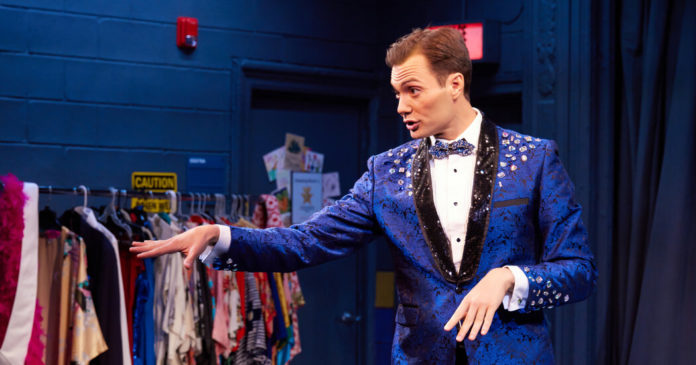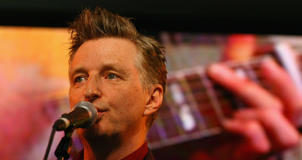
A boy forced to dim his flame discovers a local beauty pageant that sets off a spark in him again. For gay men of a certain stripe who make icons of tenacious pop divas and glamorous grandes dames, it’s a tale as old as Broadway. The self-proclaimed unicorn is now an unlikely contender in that contest, but he’s determined to win both the crown and the hearts of the town’s residents.
In “Mister Miss America,” which opened on Monday night at the Rattlestick Playwrights Theater, the writer and performer Neil D’Astolfo takes us behind the scenes and into the Southern-fried confidence of Derek Tyler Taylor, a flamboyant and fast-tongued trailblazer. Derek, in his mid-20s, is the first male contestant in an old-fashioned Virginia pageant, and though the rules have been bent just enough to let him compete, the extent of his welcome remains uncertain.
D’Astolfo turns the audience into Derek’s confessor and personal cheering squad, as the other beauty queen hopefuls in this solo play, produced by All For One Theater, are talked about but not seen. He enters his dressing room shrieking with excitement, but it soon becomes clear that not everyone is as thrilled with Derek’s participation.
If a beauty pageant is just a dog show for people, this one is “tops-to-bottoms full of bitches,” quips Derek, who works as an assistant manager at a Petco. His competitors include a top-seeded rival whose bigotry and ultimate hypocrisy represent the obstacles in the way of the sashaying hero’s journey.
Derek’s brashness is, of course, a cover for the hurt of rejection. His mom at least stopped throwing things at him when he learned to bottle himself up, he jokes. Like any savvy pageant participant, Derek is poised and in control even as he reveals the bruises beneath his bravado. In a menagerie of toy canines, Derek is a wolf in a sapphire tuxedo with the voracious will of Patti LuPone devouring “Rose’s Turn.”
Derek’s elaborate obsession with LuPone, like many of the gay cultural touchstones in “Mister Miss America,” is not exactly original territory. Indeed, as much as Derek cuts a rebellious figure on the small-town stage, his allusions and affinities as a gay man are down-the-middle, almost to the point of cliché.
Still, D’Astolfo’s writing crackles with delightful turns of phrase that slip by almost before they register. “Hand to Gaga, I didn’t know it would be such a fuss to enter this here competition,” he swears. But could anyone this fabulous be an abomination? “No way, Mary J!”
D’Astolfo is also an immensely likable performer. As Derek, he is haughty but vulnerable, an unselfconscious and assured storyteller, whether tearing into his adversaries or recalling an ill-fated bus trip to see LuPone perform in “Gypsy.” He can land a punchline with his eyes alone.
Under the direction of Tony Speciale, the production flips easily between backstage confessionals and the showdown out front, where Derek’s talent is the beloved gay art of lip-syncing. Lighting by Travis McHale does scene transporting work on an uncluttered gray set by the designer Se Hyun Oh, while costumes by Hunter Kaczorowski, sparkling on a rack to the side, lend Derek do-it-yourself flash and flare.
As up-to-the-minute as D’Astolfo’s pop references may be, there’s a retro quality to both the setting and the character that feels a step behind the times. If a country boy were looking for inspiration, the only beauty pageant of any relevance he would find on TV in the past decade is one made especially for people like him and hosted by RuPaul.
Turning trauma into opulent self-presentation has long been a favored form of queer artists, and it’s more popular than ever. The global “Drag Race” franchise has turned the act of defying gender norms through polished performance and the excavation of personal hardship into mainstream entertainment. That means there’s plenty of appetite for a show like “Mister Miss America” — and that it has a lot more to measure up to than a backwater dog and pony show.








